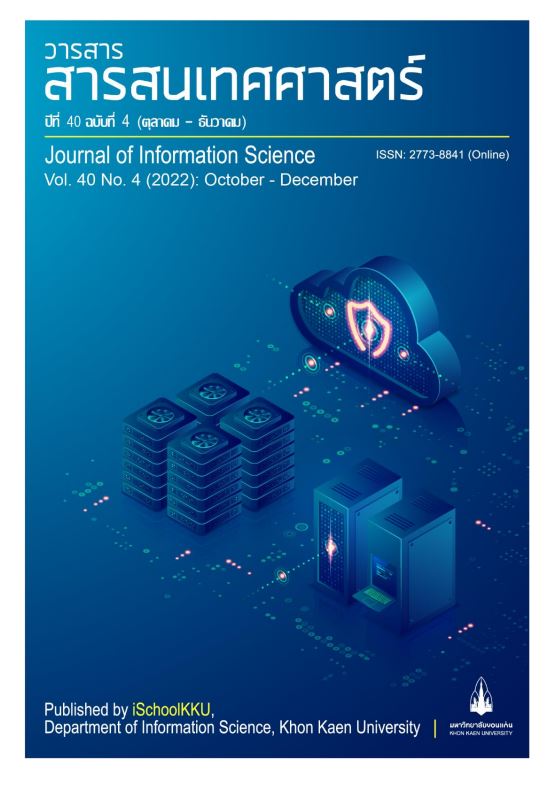A Geographic Information System for Virtual Tourism in Three Southern Border Provinces
DOI:
https://doi.org/10.14456/jiskku.2022.23Keywords:
Geographic information system, Virtual tourism, Three Southern border provincesAbstract
Purpose: This research aimed at developing a geographic information system (GIS) for virtual tourism in the three southern border provinces and measuring the effectiveness of the system and its users’ satisfaction.
Methodology: This research and development (R & D) study gathered tourism data for creating the GIS for virtual tourism in the southern border provinces. Five information technology experts were asked to assess the system effectiveness, while the system users’ satisfaction was measured by 400 tourists and general public.
Findings: This developed GIS effectiveness was found to attain the excellent level ( = 4.57, S.D. = 0.186), and the system users’ satisfaction reached the highest level
at = 4.51, S. D. = 0.318. This study promoted the southern tourism providing such interesting tourism information to visitors as touristic spots and their routes, and traditional and cultural diversity valuable for preservation using this GIS.
Applications of the study: Results of the study can be used to revitalize tourism in the three southern border provinces for higher income generation and better living of the communities in the areas.
Downloads
References
Anisya, A., & Swara, G. Y. (2017). Implementation of haversine formula and best first search method in searching of tsunami evacuation route. (In Thai). IOP Conference Series: Earth and Environmental Science, 97(1).
Buangam, P., & Sriyom, U. (2020). The student geographic information system for support consideration of student loan. (In Thai). Journal of Applied Informatics and Technology, 2(2), 116–132.
Bunnam, C., Rinthaisong, I., & Songsom, A. (2017). The collaborative model between public sectors and community organizations to decrease violence in unrest areas of southernmost provinces. (In Thai). FEU Academic Review, 11(3), 118–118.
Chowkoksung, S., & Snae, C. (2011). The development of a web-based system on gis for tourist information system and tourism packaging. (In Thai).Journal of Humanities and Social Sciences Ubon Ratchathani University, 2(1), 31–45.
Cochran, W. G. (1977). Sampling techniques, 3rd Edition. New York: Wiley.
Joobanjong, W., Sanchana, W., Mulom, R., & Suesatsakulchai, A. (2021). Tourism promotion in Tak province using virtual reality technology. (In Thai). Journal of Information Science and Technology, 11(1), 56–64.
Limpinan, P. (2019). Promoting Mahasarakham tourism by using augmented reality. (In Thai). Journal of Technology Management Rajabhat Maha Sarakham University, 6(1), 8–16.
Maneetoem, A., Pratoomta, N., & Kingthong, W. (2020). The development of geographic information systems for crop cultivation and food production and agricultural tourism in Phetchaburi province.
(In Thai). Journal of Applied Informatics and Technology, 2(1), 1–18.
Phakdiwatanakul, K. & Panichkul, P. (2003). System analysis and design. Bangkok: KTP Comp and Consulting.
Petagon, R., Maneelert, C., & Rattanachuchok, P. (2019). The development of geographic information system for tourism in muang kaen pattana municipality, Chiang Mai. (In Thai). Sripatum Chonburi Journal, 16(2), 80–89.
Phaosawad, M., & Kattachan, P. (2015). Adevelopment of dhamma retreatmanagement information system: a case study of Payayang temple. (In Thai). VRU Research and Development Journal Science and Technology, 10(3), 33–42.
Phengsuk, T. (2018). The information development of the buddha’s footprint heritage tourism-route by the Google API. case study: Bua-Bok buddha’s footprint in Udon Thani. (In Thai). Journal of Humanities and Social Sciences, Rajapruk University, 4(2), 52–63.
Phimphakarn, K., Mitranun, C., & Prasertsin, U. (2017). Resilience experience of widow from the situation of unrest in the southern border provinces. (In Thai). Thai Journal of Health Education, 40(1), 118–130.
Phoomborplub, W. (2018). Sport tourism advantage on Thai southern border province. (In Thai). Veridian E-Journal Silpakorn University (Humanities, Social Sciences and Arts), 11(2), 1793–1811.
Pralabraksa, N. (2019). The development of multimedia in the 360 perspective view to promote Rajabhat Maha Sarakham University on Google street view. (In Thai). Journal of Technology Management Rajabhat Maha Sarakham University, 6(2), 80–89.
Puttitaweesri, P., Kranruang, D., & Rimphati, W. (2019). Development of smartphone-based navigation system in Ratchaburi. ASEAN Journal of Scientific and Technological Reports, 22(1), 97–108.
Ratchavieng, A. (2018). The development of geographic information system for tourism industry in Tha Chin river. (In Thai). Journal of Humanities and Social Sciences Thonburi University, 12(28), 37–51.
Srisa-ard, B. (2017). Basic research. (In Thai). Bangkok: Suweeriyasan.
Thosatham, N., & Mingmueang, C. (2021). The Songthaew application: a local public transportation in Mueang Sakonakhon with Google Map API. (In Thai). Science and Technology Journal of Sisaket Rajabhat University, 1(2), 12-22.
Tungseng, T. (2021). Guidelines for community based tourism development in the three southern border provinces based on Thailand’s criteria for community based tourism. (In Thai). Journal of Community Development and Life Quality, 9(2), 183-193.
Tuntavanitch, P., & Jindasri, P. (2018). The real meaning of IOC. (In Thai). Journal of Educational Measurement Mahasarakham University, 24(2), 3–12.








